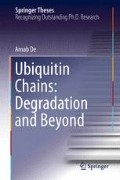Abstract
Ubiquitination of multiple signaling adaptor molecules by K63-linked ubiquitin chains have been proposed to be a key regulatory mechanism in NF-κB activation. Deubiquitinase enzymes such as A20 have been suggested to limit the persistence of NF-κB activation by removing regulatory ubiquitin chains from ubiquitinated substrates. A20 has garnered significant interest as mice lacking A20 die prematurely from multiorgan inflammation and cachexia, as a result of increased NF-κB signaling. Thus, it is evident that A20 is nonredundant in its ability to limit the persistence of NF-κB signaling. To understand the physiological relevance of A20-mediated deubiquitination, we generated knock-in mice that lack the deubiquitinating function of A20 (A20-OTU mice). We hypothesized that these mice would have an inflammatory phenotype because of increased, persistent NF-κB signaling. However our results show that A20 OUT mice display normal NF-κB activation and no inflammatory phenotype, thereby demonstrating that the deubiquitinase activity of A20 is dispensable for normal NF-κB signaling.
This chapter was originally published as The deubiquitinase activity of A20 is dispensable for NF-κB signaling in EMBO Reports, John Wiley & Sons, Ltd, 15(7), 2014, 775–783, http://dx.doi.org/10.15252/embr.201338305. First published online 30 MAY 2014 ©Arnab De, Teruki Dainichi, Chozha Vendan Rathinam and Sankar Ghosh.
Access this chapter
Tax calculation will be finalised at checkout
Purchases are for personal use only
References
Hayden MS, Ghosh S (2012) NF-kappaB, the first quarter-century: remarkable progress and outstanding questions. Genes Dev 26:203–234
Chen ZJ, Sun LJ (2009) Nonproteolytic functions of ubiquitin in cell signaling. Mol Cell 33:275–286
Opipari AW Jr, Hu HM, Yabkowitz R, Dixit VM (1992) The A20 zinc finger protein protects cells from tumor necrosis factor cytotoxicity. J Biol Chem 267:12424–12427
Song HY, Rothe M, Goeddel DV (1996) The tumor necrosis factor-inducible zinc finger protein A20 interacts with TRAF1/TRAF2 and inhibits NF-kappaB activation. Proc Natl Acad Sci U S A 93:6721–6725
Heyninck K, De Valck D, Vanden Berghe W, Van Criekinge W, Contreras R, Fiers W, Haegeman G, Beyaert R (1999) The zinc finger protein A20 inhibits TNF-induced NF-kappaB-dependent gene expression by interfering with an RIP- or TRAF2-mediated transactivation signal and directly binds to a novel NF-kappaB-inhibiting protein ABIN. J Cell Biol 145:1471–1482
Jaattela M, Mouritzen H, Elling F, Bastholm L (1996) A20 zinc finger protein inhibits TNF and IL-1 signaling. J Immunol 156:1166–1173
Lee EG, Boone DL, Chai S, Libby SL, Chien M, Lodolce JP, Ma A (2000) Failure to regulate TNF-induced NF-κB and cell death responses in A20-deficient mice. Science 289:2350–2354
Boone DL et al (2004) The ubiquitin-modifying enzyme A20 is required for termination of Toll-like receptor responses. Nat Immunol 5:1052–1060
Turer EE, Tavares RM, Mortier E, Hitotsumatsu O, Advincula R, Lee B, Shifrin N, Malynn BA, Ma A (2008) Homeostatic MyD88-dependent signals cause lethal inflammation in the absence of A20. J Exp Med 205:451–464
Lu TT et al (2013) Dimerization and ubiquitin mediated recruitment of A20, a complex deubiquitinating enzyme. Immunity 38:896–905
Wertz IE et al (2004) De-ubiquitination and ubiquitin ligase domains of A20 downregulate NF-kappaB signalling. Nature 430:694–699
Evans PC, Ovaa H, Hamon M, Kilshaw PJ, Hamm S, Bauer S, Ploegh HL, Smith TS (2004) Zinc-finger protein A20, a regulator of inflammation and cell survival, has de-ubiquitinating activity. Biochem J 378:727–734
Shembade N, Ma A, Harhaj EW (2010) Inhibition of NF-kappaB signaling by A20 through disruption of ubiquitin enzyme complexes. Science 327:1135–1139
Li L, Hailey DW, Soetandyo N, Li W, Lippincott-Schwartz J, Shu HB, Ye Y (2008) Localization of A20 to a lysosome-associated compartment and its role in NFkappaB signaling. Biochim Biophys Acta 1783:1140–1149
Ma A, Malynn BA (2012) A20: linking a complex regulator of ubiquitylation to immunity and human disease. Nat Rev Immunol 12:774–785
Singer A, Adoro S, Park J-H (2008) Lineage fate and intense debate: myths, models and mechanisms of CD4- versus CD8-lineage choice. Nat Rev Immunol 8:788–801
Komander D, Barford D (2008) Structure of the A20 OTU domain and mechanistic insights into deubiquitination. Biochem J 409:77–85
Lin SC, Chung JY, Lamothe B, Rajashankar K, Lu M, Lo YC, Lam AY, Darnay BG, Wu H (2008) Molecular basis for the unique deubiquitinating activity of the NF-kappaB inhibitor A20. J Mol Biol 376:526–540
Bosanac I et al (2010) Ubiquitin binding to A20 ZnF4 is required for modulation of NF-kappaB signaling. Mol Cell 40:548–557
He KL, Ting AT (2002) A20 inhibits tumor necrosis factor (TNF) alpha-induced apoptosis by disrupting recruitment of TRADD and RIP to the TNF receptor 1 complex in Jurkat T cells. Mol Cell Biol 22:6034–6045
Liu S, Chen ZJ (2011) Expanding role of ubiquitination in NF-[kappa]B signaling. Cell Res 21:6–21
Lodolce JP et al (2010) African-derived genetic polymorphisms in TNFAIP3 mediate risk for autoimmunity. J Immunol 184:7001–7009
Werner SL, Kearns JD, Zadorozhnaya V, Lynch C, O’Dea E, Boldin MP, Ma A, Baltimore D, Hoffmann A (2008) Encoding NF-kappaB temporal control in response to TNF: distinct roles for the negative regulators IkappaBalpha and A20. Genes Dev 22:2093–2101
Tavares RM et al (2010) The ubiquitin modifying enzyme A20 restricts B cell survival and prevents autoimmunity. Immunity 33:181–191
Skaug B, Chen J, Du F, He J, Ma A, Chen ZJ (2011) Direct, noncatalytic mechanism of IKK inhibition by A20. Mol Cell 44:559–571
Rao P et al (2010) IkappaBbeta acts to inhibit and activate gene expression during the inflammatory response. Nature 466:1115–1119
Author information
Authors and Affiliations
Rights and permissions
Copyright information
© 2015 Springer International Publishing Switzerland
About this chapter
Cite this chapter
De, A. (2015). The Deubiquitinase Activity of A20 Is Dispensable for Its Role in NF-κB Signaling. In: Ubiquitin Chains: Degradation and Beyond. Springer Theses. Springer, Cham. https://doi.org/10.1007/978-3-319-14965-3_3
Download citation
DOI: https://doi.org/10.1007/978-3-319-14965-3_3
Published:
Publisher Name: Springer, Cham
Print ISBN: 978-3-319-14964-6
Online ISBN: 978-3-319-14965-3
eBook Packages: Biomedical and Life SciencesBiomedical and Life Sciences (R0)

